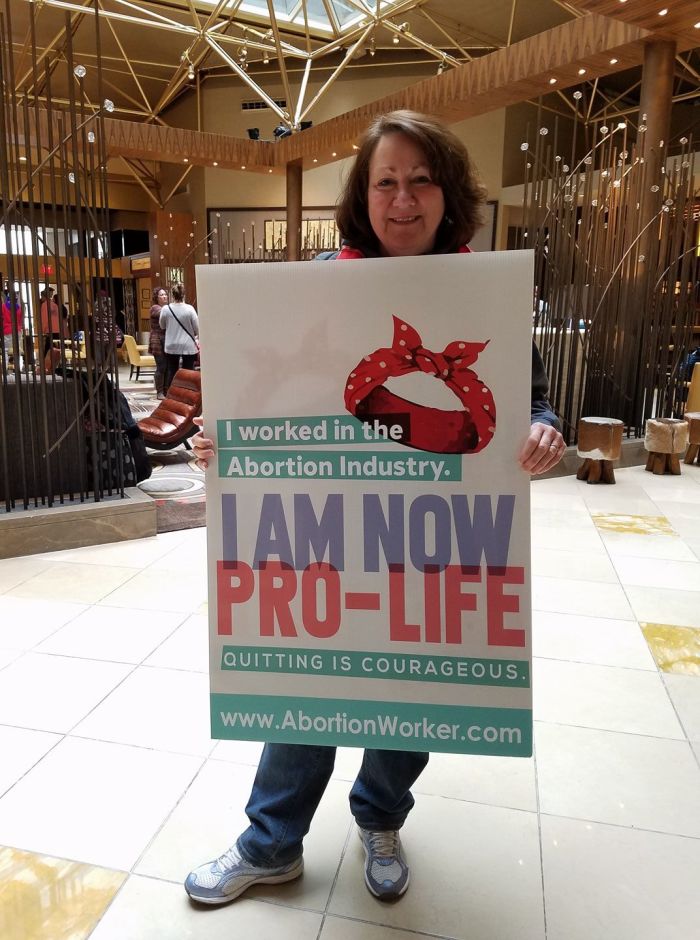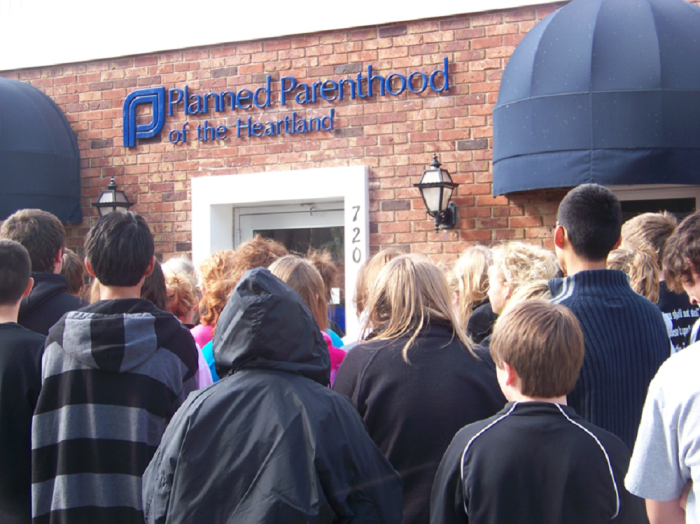Former Planned Parenthood manager says evangelical church saved her life

A former Planned Parenthood clinic manager says that joining a small nondenominational evangelical church “saved her life” and helped equip her to leave the nation’s largest abortion provider.
Sue Thayer, a Christian mother of five, worked nearly 18 years as nonmedical staff with Planned Parenthood of the Heartland in Iowa before she was fired for voicing her objection to the business' attempt to institute “webcam abortions” at her clinic.
Thayer began working at Planned Parenthood in 1991, thinking that she'd be “helping women,” she said in an interview with The Christian Post. The pay was great, and within a month of working there, she was sent to train at an abortion unit.
“I really wasn’t prepared for what I saw and experienced,” she said, adding that she's often asked why she didn’t quit her job then.
After seeing the horrors of surgical abortion, she decided it was best that she commit to working on Planned Parenthood’s family-planning programs.
Although Thayer’s Planned Parenthood facility in Storm Lake didn’t initially offer abortion (with the closest abortion facility being over two hours away), it was in 2007 that Planned Parenthood instituted telemedicine abortions at her facility and others throughout the state.
Also known as “webcam abortion,” the procedure involves a woman going into a Planned Parenthood clinic where no doctor is present and taking pills for a chemical abortion while a doctor watches via the internet. In the case of Thayer’s facility, they would do webcam procedures with doctors in places as far away as Des Moines, which is over 150 miles away.
“[N]onmedical staff like myself and my employees that I had hired would be doing transvaginal ultrasounds, which are an invasive procedure. We were going to be doing those after only a single day of training,” she explained. “I kept asking my boss if this was even legal. They were like, ‘Our I’s are dotted and our T’s are crossed, nothing will stop us.’ I would question the wisdom or the legality or the ethics of having a nonmedical person doing an invasive procedure. They just said, ‘If you are breathing, you can do it and if you can play a video game, it is a lot like running a joystick.’ I was really concerned about that.”
Thayer was vocal in her opposition and ended up getting fired.
Committing over 300,000 abortions per year nationwide, Thayer said that she knew Planned Parenthood was “notorious for doing horrible things” but was afraid to leave behind the well-paying job that she needed to provide for her family.
Having grown up at a large denominational church and attending that church for most of her life, Thayer received mixed messages of support and condemnation from different pastors at her congregation.
“[W]e had a pastor that was very comfortable with abortion and my job there. I had one of the pastors there say, ‘When you start doing abortions, can I come down and escort the women in?’ I thought, ‘Aren’t you supposed to be on the other side?’” Thayer recalled. “We also had a pastor there that was like, ‘You are in the wrong place and you got to get out of there.’ It flip-flopped but I finally knew in my heart that I had to get out of there.”
While still employed by the abortion giant, Thayer said she began listening to Christian radio more frequently and grow in her faith. After a while, she realized that her denominational church was the “wrong place” for her.
“Because of Christian radio and listening to that and just getting a handle on how much God loves me, it was just a natural step to leave there and I didn’t know where to go,” she explained. “I ended up at this other big church and that was not quite right either.”
Struggling with a divorce that she didn’t see coming, Thayer started attending a nondenominational megachurch where she tried desperately to fit in.
“They had big screens and more upbeat worship. I thought it was the perfect place.
I went there for a couple of years and they told me that I would never be a member,” Thayer recalled. “They were like, ‘You work at Planned Parenthood, you can’t be a member.’”
Thayer said she was devastated. She then turned to the small nondenominational Faith Bible Christian Outreach Center in Storm Lake, one of the same churches that protested outside her abortion clinic.
“They are all about the Gospel and loving people,” Thayer said, adding that they loved her as Jesus would. “They welcomed me and really saved my life. God used them and Christian radio to save my life.”
Thayer said she continued working at Planned Parenthood for about five years while attending Faith Bible Christian Outreach Center.
“It was really that unconditional love,” she added. “I talked with them at length and I talked with the elders. We talked about what goes on there. I remember when I heard about webcam abortions. I was so mortified because this was just another new horrible level to what they are doing.”
Thayer explained that Planned Parenthood’s entry into webcam abortions was another attempt by the organization to “be over the edge.”
“When I told my pastor and the board what was going on they were supportive [of me]. I was a single mom and had all these kids, and if I lose my job I will never find any place else where I get paid like that,” she explained. “They were telling me that God will provide and I need to leave that to Him. He has. He has been very faithful to not only meet our needs but just provide everything. I am just very thankful to Him for His faithfulness to see us through.”
Thayer said that one of the hardest things for her was getting over the guilt she felt after pressuring women to get abortions.
But even before her departure from Planned Parenthood, she was able to provide valuable information about telemedicine abortions to Iowa Right to Life, the state’s leading pro-life advocacy organization, after hearing about them on the radio.
“I knew that my days there were numbered but I did try to hang on so I could share information with Iowa Right to Life, thinking that somehow they would fix it,” she explained.

After her departure, Thayer stayed away from pro-life advocacy for two years until the fall of 2011 when she felt called to lead a 40 Days for Life 40-day vigil campaign outside the very same Planned Parenthood clinic that she used to work at.
A couple of months after the prayer campaign, the clinic in Storm Lake closed down permanently.
“This is exactly what we prayed for and I was surprised that God answered it,” Thayer said. “That shows you where I was at in my faith.”
Although webcam abortions are still legal in Iowa, the number of Planned Parenthood clinics in the state has decreased by about two-thirds over the last decade.
There used to be 29 Planned Parenthood clinics in Iowa with most of them doing abortions, Thayer said. But today, there are only eight Planned Parenthood clinics in the Hawkeye State.
“Eight is still way too many,” Thayer contended. “At one time, we had more Planned Parenthoods per capita in Iowa than any other state.”
Thayer went on to found the Cornerstone For Life Pregnancy Resource Center in Storm Lake, a facility that offers free ultrasounds, pregnancy testing and helps with societal barriers for young, single mothers like employment, transportation and housing.
In December, Thayer will officially begin working for 40 Days for Life, a national grassroots pro-life organization that holds campaigns across the country, as its new director of outreach.
Thayer previously filed a False Claims Act complaint accusing Planned Parenthood’s Iowa affiliate of engaging in Medicaid fraud. She also testified before the House Judiciary Committee in 2015 about Planned Parenthood’s practices.
In an interview last week, new Planned Parenthood President Leana Wen asserted that the abortion business provides “life-saving care” and that healthcare services shouldn’t be politicized. Planned Parenthood claims that abortions are just 3 to 10 percent of what it does when you count up all of its other health services such as pap smears, birth control.
“I used to argue that. I used to be the person that argues that 97 percent of what we [provide is] medical care to women that might not have health services,” Thayer said. “It is creative accounting. If you figure that one woman comes in 12 times in a year to get birth control pills and another women come in for abortion. You would say that 50 percent of the women that go there have had an abortion. But Planned Parenthood counts the 12 supply visits in the mix. Instead of being 50 percent, they count every single visit. That is how they arrive at that figure. It is very misleading and not true. It is not right.”




























